Prenatal vitamin D supplements could boost a child’s bone density and lean mass well past infancy.
A recent U.K. study, published in The American Journal of Clinical Nutrition, has revealed that pregnant women taking vitamin D supplements may improve the bone health of their children up to age seven. The research team tracked the outcomes of children whose mothers received vitamin D during pregnancy, focusing on bone density and lean body mass.
During pregnancy, vitamin D supports the transfer of calcium, essential for fetal bone development. Previous research has uncovered a link between a mother’s vitamin D levels and improved skeletal development in infants, but this study sought to explore how long these benefits might continue well behind childbirth. To answer this question, the team analyzed data from the Maternal Vitamin D Osteoporosis Study (MAVIDOS trial).
Participants in the MAVIDOS trial were pregnant women who had blood vitamin D levels in a specific range at the start of the study. They were divided into two groups, with one group receiving 1,000 international units (IU) of vitamin D3 (cholecalciferol) daily from the 14th week of pregnancy until delivery. The other group received a placebo. The trial was a double-blind one, meaning neither the participants nor the researchers knew who received the actual supplement versus the placebo.
Following childbirth, the team collected data on the infant’s birth weight, gestational age, and breastfeeding duration. Follow-ups were conducted at age four and again at ages six to seven, where physical measurements such as weight, height, and activity levels were recorded. To assess bone health, dual-energy X-ray absorptiometry (DEXA) scans measured and other bone metrics for both the lumbar spine and the whole body. These scans also provided insights into body composition, allowing the researchers to observe changes in both bone density and lean mass.
The results revealed a significant increase in bone mineral density for children whose mothers had received vitamin D supplements. By age six or seven, these children demonstrated higher overall density, particularly in the spine, and increased lean mass compared to those in the placebo group. The researchers noted that these benefits appeared to be consistent over time, suggesting that prenatal vitamin D supplementation may have a lasting positive impact on a child’s skeletal structure.

Interestingly, the effect on lumbar spine bone density was especially noticeable, while the impact on whole-body bone density was stable over the years. This consistency hints at vitamin D’s role in supporting ongoing skeletal development. Other metrics, such as bone area and bone mineral content (BMC), showed more significant effects at age four but seemed to level out by ages six and seven. This pattern suggests that some benefits of vitamin D on bone health may be more pronounced earlier in childhood but may persist at lower levels as the child grows.
The study also considered additional variables that may have influenced bone health, such as breastfeeding duration, physical activity, and vitamin D intake after birth. Statistical analysis confirmed that the positive effects of maternal vitamin D supplementation remained even after accounting for these factors. Interestingly, no difference in effect was observed based on the child’s gender, indicating that both boys and girls may benefit equally from their mothers’ prenatal vitamin D intake.
Overall, the researchers suggested that supplementation during pregnancy could be a relatively simple and effective approach to boosting bone health outcomes for children. This could eventually inform pregnancy guidelines and strategies centered around the role of maternal in predicting a child’s health outcomes in the first few years of life.
Sources:
Pregnancy vitamin D supplementation boosts bone density in kids up to age 7


Join the conversation!